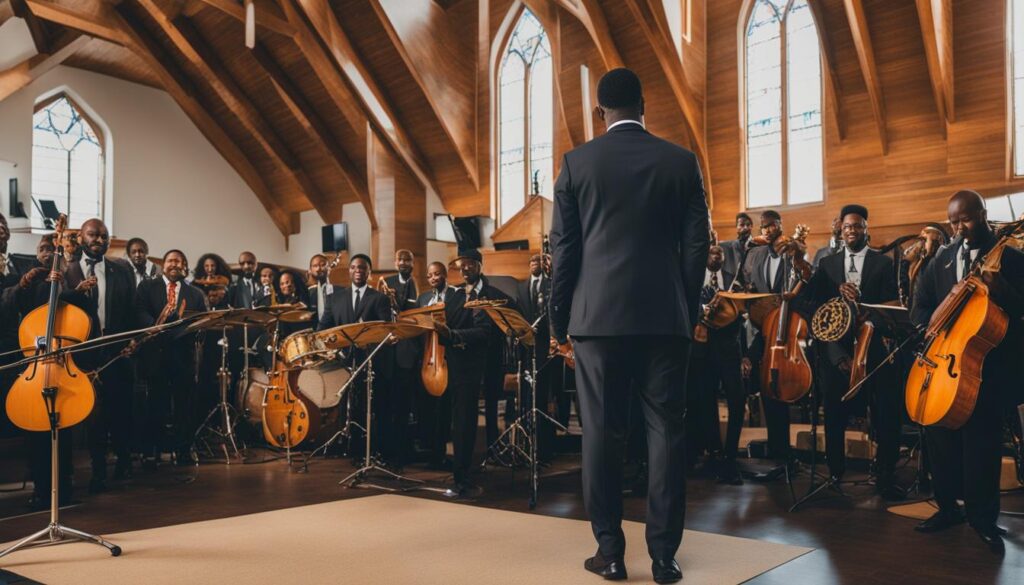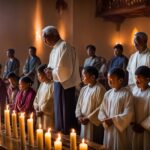A worship leader holds a special position in a church community, guiding and inspiring congregants in their worship experience. Their role encompasses various responsibilities that contribute to creating a meaningful and engaging atmosphere during services. Crafting a well-defined worship leader job description is essential for attracting qualified candidates who can fulfill these responsibilities and lead the congregation in worship.
Key Takeaways:
- A worship leader plays a pivotal role in creating a meaningful worship experience for the congregation.
- A comprehensive job description helps attract qualified candidates for the position of a worship leader in your church.
- The job description should outline the responsibilities, qualifications, and application process.
- Customize the job description to fit your church’s specific needs and values.
- By finding the right worship leader, you can enhance your church’s worship experience and foster a spirit of worship among congregants.
How to Craft a Worship Leader Job Description
Creating an effective worship leader job description is essential to attract qualified candidates for your church. A well-crafted job description provides a clear overview of your church and its worship style, while outlining the main duties and responsibilities of the position. By following a few key steps, you can ensure that your worship leader job description accurately reflects the role and attracts candidates who align with your church’s vision.
1. Provide an Overview of Your Church and Worship Style
Begin the job description by providing a brief overview of your church, including its mission, values, and worship style. This will help potential candidates understand the context in which they would be serving and determine if they are a good fit for your church.
2. Clearly Define the Duties and Responsibilities
Outline the main duties and responsibilities of the worship leader, emphasizing their role in leading worship during church services. Include responsibilities such as choosing appropriate music, coordinating with technical and worship teams, facilitating rehearsals, and fostering a spirit of worship.
3. Highlight the Qualifications and Skills Required
Identify the qualifications and skills required for the position, such as proficiency in playing a musical instrument, strong vocal abilities, knowledge of worship music genres, and the ability to lead and inspire worship teams. Additionally, consider including any specific requirements that are important to your church, such as previous experience in music ministry or a deep understanding of your church’s theological beliefs.
By following these steps and tailoring the worship leader job description to your specific church’s needs, you can attract qualified candidates who will effectively lead your congregation in worship.
Worship Leader Sample Key Responsibilities
A worship leader holds a pivotal role in leading and coordinating worship services, creating a transformative and meaningful worship experience for the congregation. The following are key responsibilities and duties that a worship leader may have:
- Leading worship services: The worship leader is responsible for leading the congregation in worship, guiding them through songs, prayers, and other forms of worship.
- Selecting and arranging worship songs: It is the duty of the worship leader to carefully choose worship songs that align with the theme and message of the service. They should also arrange the songs in a way that flows smoothly and engages the congregation.
- Leading musical rehearsals: The worship leader plays an important role in rehearsing and preparing the worship team. They provide musical direction, offer guidance, and ensure that the worship team is proficient in their parts.
- Providing musical direction and guidance: The worship leader sets the musical tone and style for worship services. They provide guidance to the worship team, ensuring that the music enhances the worship experience.
- Fostering a spirit of worship: The worship leader is responsible for creating an atmosphere of worship, where the congregation can connect with God and experience His presence.
- Collaborating with worship team members: A worship leader works closely with the members of the worship team, fostering a sense of unity and teamwork.
- Coordinating with technical teams: The worship leader collaborates with the technical teams to ensure that the sound, lighting, and other technical aspects of the worship service enhance the overall experience.
- Continuously developing musical skills and knowledge: A worship leader should have a passion for growing in their musical skills and knowledge. They should actively seek opportunities to learn and improve their craft.
- Supporting and mentoring worship team members: The worship leader plays a supportive role in the development of the worship team. They provide mentorship, guidance, and encouragement to team members.
In addition to these key responsibilities, a worship leader may also have additional duties specific to their church and worship style. It is important for a worship leader to have a heart for worship, strong musical skills, leadership abilities, and the ability to connect with the congregation.

Creating a comprehensive and engaging worship experience requires a worship leader who is dedicated, skilled, and passionate about leading others in worship. By understanding the key responsibilities and duties of a worship leader, churches can find the right candidate who will excel in this vital role.
Table: Comparison of Worship Leader Responsibilities
| Traditional Church | Contemporary Church | |
|---|---|---|
| Leading Worship Services | Emphasizes hymns and traditional worship elements. | Focuses on contemporary music styles and modern worship practices. |
| Selecting and Arranging Worship Songs | Includes a wide range of traditional hymns and classical music. | Features contemporary Christian songs and modern worship anthems. |
| Leading Musical Rehearsals | Typically includes a choir and may require more formal rehearsals. | Often relies on a band and may involve more informal rehearsals. |
| Providing Musical Direction and Guidance | Requires a deep understanding of traditional music theory and composition. | Involves familiarity with contemporary music styles and production techniques. |
| Collaborating with Worship Team Members | Works closely with choir members and other musicians in a structured setting. | Collaborates with a band and may involve more flexible and spontaneous arrangements. |
| Coordinating with Technical Teams | Relies on traditional audio and visual equipment for worship services. | Utilizes modern sound systems, lighting, and multimedia technology. |
Worship Leader Qualifications
Being a worship leader requires a unique set of qualifications that encompass musical talent, leadership skills, and spiritual maturity. Here are the key requirements to consider when seeking a qualified worship leader:
- Musical Proficiency: A worship leader should possess a high level of musical proficiency, including the ability to play a musical instrument and strong vocal abilities. They should be able to lead the congregation in worship through their musical talent.
- Knowledge of Worship Music Genres: A well-rounded worship leader should have a deep understanding of various worship music genres, including contemporary, gospel, hymns, and more. This knowledge enables them to curate a diverse and engaging worship experience.
- Leadership Skills: A worship leader should demonstrate strong leadership skills, including the ability to coordinate and lead a worship team effectively. They should inspire and guide team members, fostering a collaborative and cohesive worship environment.
- Spiritual Maturity: As the spiritual leader of the congregation during worship services, a worship leader should exhibit a deep spiritual maturity and a strong personal relationship with God. This allows them to lead worship from a place of authenticity and inspire others to do the same.
- Interpersonal and Communication Skills: Effective communication and interpersonal skills are essential for a worship leader. They should be able to connect with the congregation, communicate clearly with team members, and collaborate with other church staff.
- Experience in Music Ministry: Previous experience in music ministry or leading worship in a church setting is beneficial. It helps the worship leader understand the unique dynamics of leading worship within the context of a church community.
- Willingness to Learn and Grow: A worship leader should have a humble and teachable spirit, always seeking to learn and grow in their craft. They should be open to feedback and continuously strive to improve their skills and knowledge.
These qualifications form the foundation for finding a worship leader who can lead your congregation in creating a meaningful and transformative worship experience.
| Qualifications | Details |
|---|---|
| Musical Proficiency | Ability to play a musical instrument and strong vocal abilities |
| Knowledge of Worship Music Genres | Understanding of contemporary, gospel, hymns, and other genres |
| Leadership Skills | Effective coordination and guidance of worship team |
| Spiritual Maturity | Deep personal relationship with God |
| Interpersonal and Communication Skills | Effective communication and collaboration with team and congregation |
| Experience in Music Ministry | Previous experience leading worship in a church setting |
| Willingness to Learn and Grow | Openness to feedback and continuous improvement |
Remember, finding the right worship leader is not only about their qualifications but also their alignment with your church’s vision and values. The qualifications outlined here serve as a guide to help you identify candidates who possess the necessary skills and attributes to lead your congregation in worship.
Application Process
Are you passionate about leading worship and creating a meaningful worship experience for a congregation? If so, we invite you to apply for the position of Worship Leader at our church. In this role, you will have the opportunity to utilize your musical talents, leadership skills, and spiritual maturity to inspire and guide our worship team.
To apply for the position, please submit your resume, cover letter, and any additional supporting documents to our church office by the application deadline. We kindly request that you include a portfolio showcasing your musical abilities and past experiences as a worship leader. This will help us gain a better understanding of your skills and qualifications.
Once we have received your application, our hiring committee will carefully review each submission. We will assess candidates based on their musical proficiency, vocal abilities, knowledge of worship music genres, leadership skills, and alignment with our church’s vision and values. Shortlisted candidates will be contacted for an interview and may be asked to lead a worship session during the selection process.
We understand that the application and selection process can be rigorous, but it is our commitment to finding the right worship leader who will lead our congregation in creating a meaningful worship experience. We encourage all interested applicants to prayerfully consider this opportunity and submit their applications by the specified deadline.
| Application Deadline | Submission Method | Required Documents |
|---|---|---|
| July 31, 2022 | Church Office | Resume, Cover Letter, Portfolio |
Tailoring the Worship Leader Job Description for Your Church
Customizing the worship leader job description is crucial to align it with the specific needs and values of your church. While the core responsibilities and qualifications mentioned in the previous sections serve as a foundation, tailoring the job description to fit your church’s unique requirements helps attract candidates who resonate with your vision and mission.
Consider additional responsibilities and expectations that are specific to your church. For example, if your church has a vibrant youth ministry, you may want to include leading worship services in youth groups as part of the worship leader’s role. Likewise, if your church frequently organizes special events or conferences, you can highlight the need for the worship leader to coordinate and contribute to these gatherings.
It’s also essential to emphasize the importance of providing pastoral care. A worship leader not only leads the congregation in worship but also plays a vital role in creating an environment where individuals can connect with God on a personal level. Communicate the expectation for the worship leader to support and mentor worship team members, fostering growth and spiritual development.
Before finalizing the job description, proofread and refine it to ensure clarity, accuracy, and proper grammar. This step is essential as a well-crafted job description not only attracts qualified candidates but also reflects the professionalism and attention to detail of your church.

Table: Customized Responsibilities for a Worship Leader
| Responsibility | Description |
|---|---|
| Leading Worship Services | Lead engaging and meaningful worship experiences during church services, connecting the congregation with God through music. |
| Coordinating with Ministry Teams | Collaborate with technical teams, worship teams, and other ministry leaders to ensure seamless coordination and execution of worship services and events. |
| Choosing and Arranging Music | Select worship songs that align with the church’s theological beliefs, plan song arrangements, and create setlists that enhance the worship experience. |
| Providing Pastoral Care | Support, mentor, and spiritually guide worship team members, fostering an environment of growth and discipleship. |
| Continued Personal and Musical Development | Stay updated with current worship music trends, enhance musical skills, and seek opportunities for personal and spiritual growth. |
| Special Events and Outreach | Lead worship services during special events, conferences, and outreach activities, cultivating an atmosphere of worship and connection. |
Conclusion
Crafting a comprehensive worship leader job description guide is vital in finding the perfect candidate who can fulfill the essential role of leading your congregation in worship. By clearly outlining the responsibilities, qualifications, and application process, you can attract individuals who align with your church’s vision and values.
A worship leader plays a pivotal role in creating a powerful and impactful church worship experience. They lead the congregation through music, create an atmosphere of worship, and inspire others to connect with God. With a well-crafted job description, you can find a worship leader who will bring their talents, skills, and passion to enrich your church community.
Remember, the worship leader is not just a musical director but also a spiritual guide. They have the ability to uplift and inspire through their leadership and musical abilities. By customizing the job description to fit your specific church needs and continually supporting the growth and development of your worship leader, you can cultivate a thriving worship experience for your congregation.
So, take the time to carefully write your worship leader job description and find the individual who will help lead your church in creating a transformative worship experience. Through thoughtful hiring and ongoing support, you can ensure that your worship leader plays a vital role in shaping the spiritual journey of your church community.
FAQ
What are the main responsibilities of a worship leader?
The main responsibilities of a worship leader include leading and coordinating worship services, selecting and arranging worship songs, leading musical rehearsals, providing musical direction and guidance, fostering a spirit of worship, collaborating with worship team members, coordinating with technical teams, continuously developing musical skills and knowledge, and supporting and mentoring worship team members.
What qualifications are required for a worship leader position?
Qualifications for a worship leader position may include musical proficiency, strong vocal abilities, knowledge of worship music genres, leadership skills, spiritual maturity, interpersonal and communication skills, experience in music ministry, and a willingness to learn and grow.
How can I apply for a worship leader position?
To apply for a worship leader position, please submit your resume, cover letter, and any relevant portfolio or recordings to [email protected] The deadline for applications is [insert deadline].
What additional responsibilities may a worship leader have?
Some worship leaders may also have additional responsibilities specific to the church they serve, such as leading worship services in youth groups, organizing special events, or providing pastoral care.
How can I tailor the worship leader job description to fit my church?
To tailor the worship leader job description to fit your church, consider any additional responsibilities that may be specific to your church, emphasize the values and vision of your church, and ensure that the job description reflects the specific needs and culture of your congregation.









